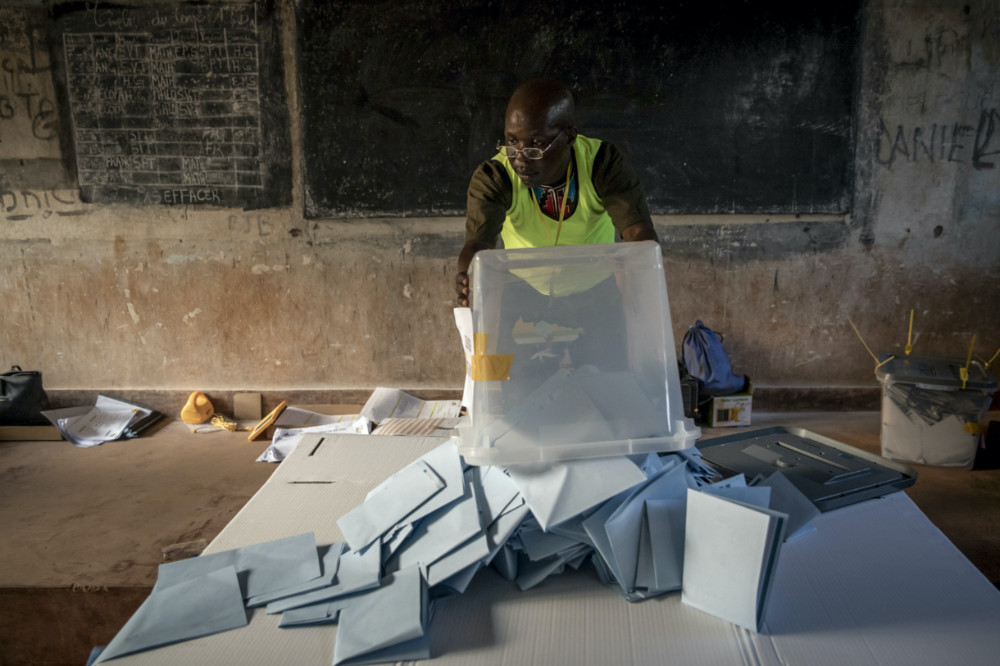Bangui, Central African Republic
AP
Central African Republic President Faustin-Archange Touadera has won a second term in office, according to provisional results announced by the electoral commission Monday.
Touadera was reelected in the first round of the 27th December presidential vote with 53.9 per cent of the votes, the National Election Authority said. In second place was Anicet-Georges Dologuele with 21.1 per cent of the vote, and Martin Ziguele came in third with 7.4 per cent, according to the results announced.

Electoral workers start to count votes at the Lycée Boganda polling station in the capital Bangui, Central African Republic, on Sunday, 27th December, 2020. The country held presidential and legislative elections Sunday amid fears of violence after a campaign period marked by fighting between rebels and government forces, and while voters came out in large numbers in the capital, in other parts of the country fewer people went to polling stations because of fears of violence or boycotts by the rebel coalition. PICTURE: AP Photo/File photo.
The vote, and its aftermath, have been marked by violence and the formation of a rebel coalition, amid calls from the opposition to delay the vote. International observers noted the vote in the capital went well, but violence prevented many from going to vote in other parts of the country, despite the presence of peacekeeping soldiers and reinforcements sent in by Russia and Rwanda after a pre-election attack.
The results must now be officially validated by the Constitutional Court, which will field appeals.
The announcement of provisional results comes as armed violence mounts outside the capital, including an attack by rebels Saturday on Touadera’s second home in Damara, a locality more than 75 kilometres from Bangui.
The attack was repulsed by the Central African Armed Forces with the support of Russians, Rwandans and Congolese soldiers who came to the Central African Republic as part of military cooperation with the nation.
Touadera has blamed former president Francois Bozize for the electoral unrest.
“At the head of this association of criminals is former President François Bozize supported by his political allies,” he said. “The attacks were aimed at overthrowing the institutions of the Republic and putting an end to the democratic process and finally to establish a first transition.”
Abacar Sabone, who runs military operations for the rebel coalition known as the CPC, said the operation was a warning to the government that the rebel coalition is capable of attacking Bangui, if Touadera doesn’t open up consultation and dialogue with the coalition.
Sabone has said if Touadera “insists on favoring the path of war we will put ourselves on all our fronts and concentrate our forces on Bangui to free him from power to set up a transitional regime managed by a neutral personality so that a sovereign national conference can be organised.”
After the announcement of the results, he said: “There is no difference in clinging to power as Touadera does and taking power by arms.”
The rebel coalition has taken control of another front in Bangassou, about 750 kilometers from Bangui forcing civilians to flee to neighboring Congo.
“The civilian population fled hostilities, many drowned in the river,” said Pierrette Benguere, the prefect of Mbomou.
The UN mission in Central African Republic, known as MINUSCA, has spoken out against the attacks.
Mankeur Ndiaye, the head of the mission, said “there is no doubt that these attacks are taking place in a context of disruption of the elections – before, during and after the polls.”
On Monday, the Attorney General at the Bangui Court of Appeal said it has opened a judicial investigation into Bozizé, who has said he is working with the rebel coalition.
The mineral-rich Central African Republic has faced deadly inter-religious and inter-communal fighting since 2013, when predominantly Muslim Seleka rebels seized power from Bozize after long claiming marginalization. Resistance to Seleka rule eventually led to Muslims being targeted en masse, with some beaten to death, mosques destroyed and tens of thousands forced from the capital in 2014.
Despite a 2019 peace agreement between the government and 14 rebel groups, intermittent violence and human rights abuses have continued.
The most recent insecurity began after the Constitutional Court rejected the candidacy of Bozize, on the grounds that he did not satisfy the “good morality” requirement.
Bozize, who took power in a coup in 2003 and ruled until 2013, faces an international arrest warrant for “crimes against humanity and incitement of genocide”. He also faces UN sanctions for his alleged role in supporting the anti-Balaka groups that resisted the Seleka in 2013.
– With EDITH M LEDERER at the United Nations and CARLEY PETESCH in Dakar, Senegal.





